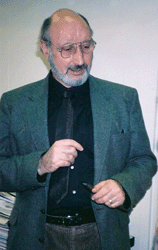Associate Dean for Research Planning and Coordination Chairman of the Department of Cell Biology 
Dr. Richard D. Berlin, a graduate of Harvard College and Harvard Medical School, was an accomplished scholar and medical researcher with a boundless intellectual curiosity and joy of learning. He was a passionate student of life, forever surrounded by books, projects and experiments.
For more than 30 years, Dr. Richard Berlin was an exceptionally important member of UConn Health faculty who contributed in so many ways as a consummate scientist, educator and administrator to the growth, development and continued well being of the educational and research enterprises of UConn Health and its schools. His intelligence, skills, professionalism, wisdom and equanimity made him an inspirational role model who had an enduring influence on us all.
After graduating from Harvard College and Medical School, Dr. Berlin went on to do a fellowship with Dr. Barry Wood at Johns Hopkins School of Medicine. His early discoveries with Dr. Wood concerning the function of an endogenous pyrogen, now known as interleukin, stimulated his lifelong interests in cell physiology. Dr. Berlin was a member of the Harvard Medical School faculty from 1964 to 1973. During that time, he published several papers on the regulation of cell surface receptors and introduced the possibility that microtubules and actin filaments may be involved in cell surface events, hypotheses that were later proven correct. He joined UConn Health in 1973, where he was chairman of the Department of Physiology (now Cell Biology) from 1973 to 2006, as well as Associate Dean for Research from 1991 to 2006. Dr. Berlin’s in-depth appreciation of both basic and clinical science was pivotal to the creation of several dynamic programs at UConn Health. He was internationally recognized for his many contributions to the understanding of the function of cell membranes and the cytoskeleton, and for his innovations in the use of microscopy. In 1976 he published the first paper on the application of Fluorescence Resonance Energy Transfer (FRET) to cell biology, an approach that is now utilized in thousands of studies each year. The Richard D. Berlin Center for Cell Analysis and Modeling is dedicated to Dr. Berlin’s achievements in basic biomedical science and the contributions he has made to all those who have and will build upon his vision.